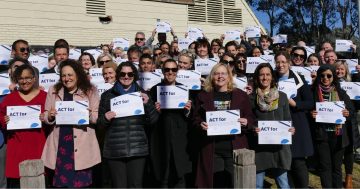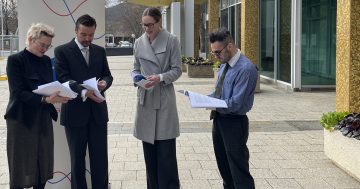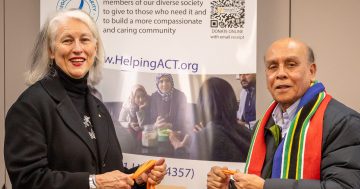
Food insecurity is now more common than when the first Anti-Poverty Inquiry was conducted in 1999. Photo: File.
This week is Anti-Poverty Week, an annual initiative that highlights poverty in Australia and its impact on local communities.
The ACT theme is ‘together preventing tipping points into poverty’. This year’s co-chairs of the community organising committee are the ACT Council of Social Service (ACTCOSS) and the Australian Red Cross – ACT.
Anti-Poverty Week is always a good opportunity to work out how we can contribute to eliminating poverty in the ACT. This Anti-Poverty Week there have been many events for Canberrans to get involved in and many organisations have been highlighting the issue and identifying solutions.
This year marks 20 years since the ACT embarked on its first inquiry into the extent and nature of poverty in the ACT.
In 1999, the ACT Poverty Inquiry was established as a joint project between the ACT Government and ACTCOSS, lead by a Taskgroup made up of experts and stakeholders across the government, business and social services sector in the ACT.
The inquiry found that one-in-12 Canberrans were living in poverty. Importantly, it identified that being poor in a community with high average incomes and household wealth was especially difficult.
It found that there were particular groups in the community were at greater risk, including single-income households, young people and people who were facing intersectional disadvantage. It also found a locational element of poverty – those living close to the city faced high costs in relation to food and rent while those in outer suburbs faced high transport costs.
This Inquiry set an important framework for the recognition of the issue of poverty and disadvantage in Canberra.
In 2000, the Government received the final report with recommendations and provided a comprehensive plan to respond to these.
Long-standing mechanisms such as the Joint Community Government Reference Group were established as part of a joint commitment to working on this issue. ACTCOSS has continued to track the impact of poverty and disadvantage over the last 20 years. Soon after the tabling of the final report, the Australia-wide Anti-Poverty Week commenced, with ACT community leaders getting involved in this initiative soon after its establishment, continuing to highlight the issue and the solutions.
Despite determined effort across a wide range of organisations and sectors over the last two decades, the number of people impacted by poverty has remained relatively stable.
But there are some reasons that have driven poverty in the ACT, and reasons why the impact is even greater now than it was in 1999. Over the period, housing affordability has become an increasingly concerning issue. The ACT has seen high rates of homelessness and increasing numbers of people sleeping rough. The decline in the spending power of income support such as Newstart over the last 25 years has made it virtually impossible to live a life of dignity when receiving these payments, as highlighted in evidence to a Federal Senate Inquiry last week.
Food insecurity, an issue that was rarely mentioned in the consultations of the first poverty inquiry, is now a common issue discussed in this town. The cost of energy that has increased significantly over the last decade is now a key cost of living issue, particularly for people on the lowest incomes.
Two decades after we acknowledged we had poverty in Canberra, it is time to reflect on the structural causes that have seen little movement in the rate of poverty over this period. I think it is time to renew our commitment to work together as a community to address the causes and work to eliminate poverty and work together to ensure that we all share the benefits of living in this beautiful place called Canberra.
What do you think we need to do to reduce the level of poverty in the ACT?
Rebecca was the project leader engaged to support the 1999-2000 ACT Poverty Inquiry. She is a previous co-chair of the ACT Anti-Poverty Coordinating Committee and sits on a number of boards and committees of local community service agencies involved in this year’s Anti-Poverty Week.




















